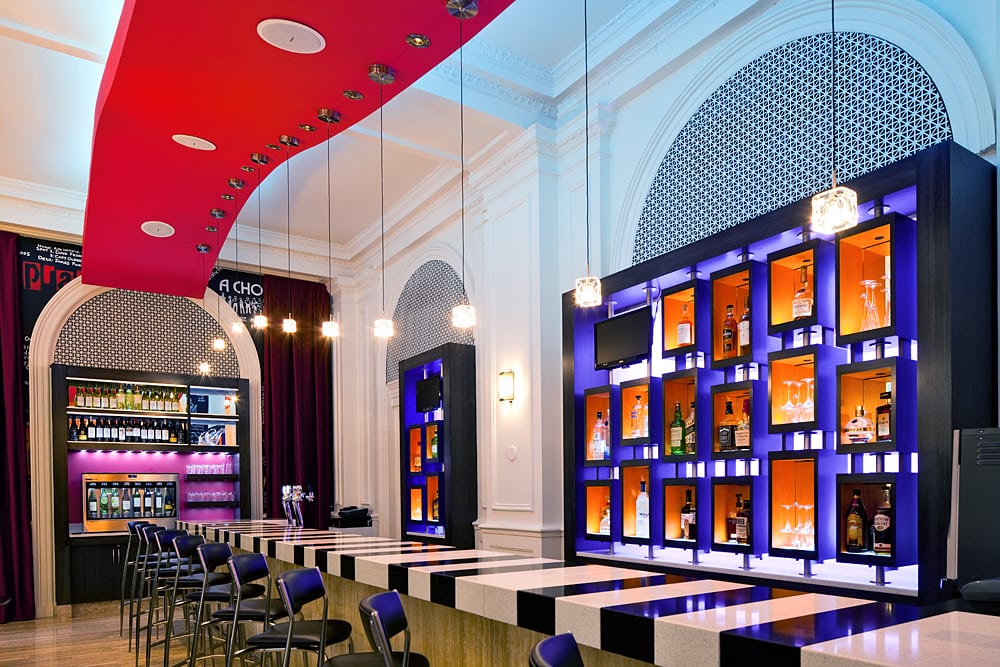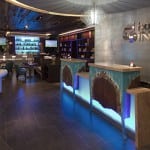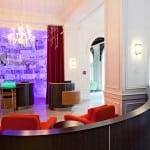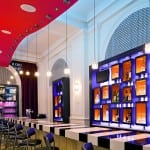Skift Take
Incorporating local culture into hotels might have started as a trend, but it's now here to stay. IHG's early local venture can teach other brands how to play nice with neighborhoods.
- The Hotel Indigo in the Del Mar area of San Diego incorporates design concepts that represents San Diego’s beautiful natural landscape.
- The Hotel Indigo in the Garden District of New Orleans is a very open space with light bright colors to ward off the heat.
- The lobby at the Hotel Indigo in Atlanta, George. The hotel incorporates Atlanta’s distinct theatre and concert scene.
- The bar at the Hotel Indigo in Atlanta, George. The hotel incorporates Atlanta’s distinct theatre and concert scene.
- A guest room in the Hotel Indigo in downtown Asheville, North Carolina. The hotel design focuses on the intersection of natural beauty and urban style,
Many travelers are looking to form deeper connections with the destinations they visit, and to meet this need hotels are becoming local ambassadors — partnering with local vendors to bring products to guests inside the hotel and hosting events that bring in the local community.
This is still relatively new for many hotels and for global brands in particular. However, InterContinental Hotels Group‘s Hotel Indigo, a self-described “branded boutique,” has been mixing local and hospitality for ten years.
Each of Hotel Indigo’s 52 properties tells a different story with distinct designs in cities around the world. Every five years, each hotel’s design is refreshed to tell a new part of its neighborhood’s story and appeal to repeat customers.
Skift spoke with the Hotel Indigo’s director of brand management Mary Winslow at the September opening ceremony for Hotel Indigo Brooklyn.
She explained how the hotel uses design and technology to connect guests with their destination. And why she’s not worried about the competition.
Skift: Why do Hotel Indigo properties change their design every five years?
Mary Winslow: With Hotel Indigo, we want to ensure that we’re always presenting a very fresh and vibrant design. Hotels, frankly, get old and tired after a lot of guests go through them, but we also want to make sure that we appear fresh to our many repeat guests.
Every five years we’ll go in and refresh our hotels. It could mean that we’ll change out an area rug, some accent pillows, or other accessories. We create stories for each one of our hotels and a good story has a lot of chapters and a lot of different characters. When we open a hotel we have such a deep and rich story to tell, we have the ability to go back in and tap into other perspectives — maybe a different character or a different part of the story.
It still feels very authentic to the holistic approach that you have, but you’re able to talk about something a little bit different. You’re able to bring on some new fresh menu items or add a new color palette or a new texture. You’re refreshing some of the murals, just to change it up a little bit. And that’s really how we keep the brand living and breathing. What we are not is a typical, traditional, beige, box cutter hotel that stays the same.
We’re a living breathing thing, just like the neighborhoods that we’re in. They’re living and they’re breathing and they’re changing. New shops are opening, new people are coming in, and we want to be just like another shop or another person in the neighborhood that refreshes itself every so often.
Skift: How does Hotel Indigo incorporate technology?
MW: (Points to a display screen in the lobby.) That is our new interactive media display, This is one of our test hotels and it is rolling out to all Hotel Indigos in the Americas by the end of this year. This is really exciting because it’s not like a traditional lobby board. You’re not going to get your boarding pass, you’re not going to check the weather, this is a way that we create a community with our guests. I’s hardware and software that’s 100 percent proprietary to Hotel Indigo. (Editor’s Note: The interactive media display is currently live in 10 pilot hotels where more than 12,000 photos had been shared as of September.)
It’s an interactive screen where you can go on and look up every Hotel Indigo in the world, read their neighborhood story, and see their photos. You can take your photo and post it to your Facebook page. You can check in and say you are here. Our guests are social media enthusiasts and they want to check in as soon as they get here.
We really want the guests at our hotels to go out and explore the neighborhood. We’re the hub for people to explore — a launching pad. This helps hotel staff tell you things to see, do taste, and hear in the neighborhood.
It will also tell you about different offers going on in the food and beverage program, so it’s also a way for the hotel to generate revenue by introducing people to new restaurants and bars and bringing them in.
Guests are spending six to twelve minutes on this thing. They’re really engaging with it and going through to look at all the Hotel Indigos in the world.
Skift: How do you make sure the staff is knowledgeable about everything going on?
MW: We have an awesome service culture program. To be a boutique hotel, service is key. It can’t be too formal, even though it’s an upscale hotel, yet you also have to respect people’s privacy. So there’s that in-between.
The “Be Inspired” program is rolled out at all of our hotels across the globe. We have a lot of activities that we take them through. We teach them about different social cues so you may check in and you have a yankees cap on staff will say, “Hey, did you the Yankees are playing in the Brew House tonight? We’d love for you to come by and have a beer with us.”
It’s trying to pick up subtle nuances so that we can really cater to something cool. Let’s say that someone at the front desk notices that you’re leaving to go jogging every morning at 6 am. They may have a power bar or a bottle of water waiting for you the next morning when you come out because they’ve noticed. It’s all about just picking up these social cues.
The service culture, for us, is paramount to the success. I talked about the three hallmarks of the brand: service culture, the neighborhood story, and design. They all have to play equally, otherwise it doesn’t work. Otherwise, you’re another hotel. When three of those things come together, that’s when you have a Hotel Indigo. That’s when you really have something that’s operating on all cylinders.
Skift: What about other brands? Is it like any other hotel brands out there?
MW: To be honest, there really are no other branded boutiques that are big players right now. We are not a lifestyle hotel. We are truly a branded boutique so we’ve got the benefits and reassurances of a big loyalty program and a reservations system and the support of IHG. But then you dial up on this boutique side.
Our competitors are really other boutique hotels. I don’t think there are many other brands that deliver what we deliver.
Skift: What about Aloft? Is that a competitor?
MW: Aloft is a great product, but its a prototypical hotel. Every Aloft that you go to has the same front desk and the same bar, food, and beverage concept. They certainly did something a little different ,which is great since it exposes people to non-traditional hotels. But they are still the same everywhere you go.
Every Hotel Indigo is different. We have things that are common across all of our hotels. Every hotel has a neighborhood story that it tells and our hotels use murals as well as local art to bring that to life. Every hotel has hard surface flooring. Every hotel has spa-inspired showers.
If you look at some of our photos you’ll see how the room looks in Brooklyn, how it looks in Chealsea, and how it looks in San Diego. What you notice is the consistency in terms of those features, but they come to life literally in 52 different ways.
Skift: Can you tell me about the brand’s plan to expand?
MW: We’ve got about 50 hotels in the pipeline, which is really exciting. This year we’ve opened in Brooklyn, Barcelona, Tel Aviv, and Hong Kong. We’ll also be opening in Madrid, Dusseldorf, St. Petersburg, and Anaheim. We’ve had a really phenomenal growth trajectory. The brand will 10 years old next year.
Skift: Is there growing competition as hotel localism becomes more mainstream?
MW: We’ve got some good history, we’ve got some good momentum. I hope that gives us a step up against the competition when they do come, because we’ve got 52 success stories that we can look back on. We learn and grow every time, whether it’s different things you can do from a service perspective or different product enhancements. Because we always want to challenge ourselves. You know, you want to stay true to what the brand is but you want to out do the last one that you did. ITs a really exciting time for us.
Have a confidential tip for Skift? Get in touch
Tags: branding, intercontinental hotel group, local
Photo credit: The bar at the Hotel Indigo in Atlanta, George. The hotel incorporates Atlanta's distinct theatre and concert scene. Hotel Indigo





